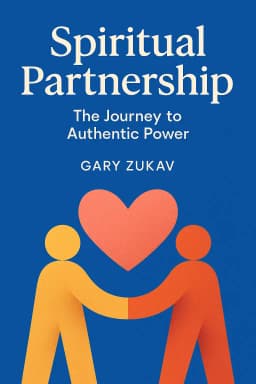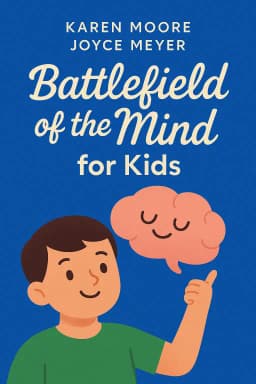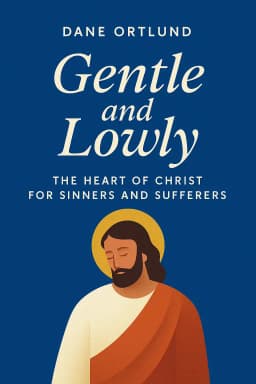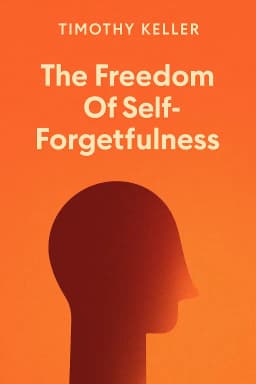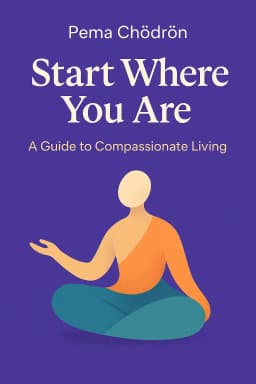
The Loving 'No'
Loving Others Without Losing the Best of Who You Are
Golden Hook & Introduction
SECTION
Daniel: Here's a thought: What if the most 'loving' thing you can do for someone is to say 'no'? What if being endlessly accommodating and forgiving is actually the most unloving thing you can do in a relationship? Sophia: Whoa, hold on. That sounds completely backward. Everything we're taught about being a good person, a good friend, a good partner, is about sacrifice and putting others first. Saying 'no' feels selfish. Daniel: It feels selfish, but it might just be the key to real, sustainable love. That's the provocative heart of the book we're diving into today: Good Boundaries and Goodbyes by Lysa TerKeurst. Sophia: And what makes her perspective so powerful is that it’s not just theory. TerKeurst is the president of a massive women's ministry, Proverbs 31 Ministries, but she wrote this book in the wake of her own painful and very public divorce. This isn't an academic exercise; it's wisdom forged in fire. Daniel: Exactly. She’s lived the consequences of getting this wrong, and the book is her guide to getting it right. It became a huge bestseller, and for good reason. It tackles a problem almost everyone feels but can't quite name. Sophia: I can see why. The title alone is a gut punch for anyone who's ever felt trapped in a difficult relationship.
The Hallmark Movie Lie: Why 'Love' Isn't Enough
SECTION
Daniel: Well, TerKeurst kicks things off by taking a shot at something we all secretly love to hate: Hallmark movies. Sophia: Oh, I love this already. The land of flannel shirts, charming small towns, and problems that get solved in 90 minutes. Daniel: Precisely. She tells this brilliant story where she imagines she's rewriting a Hallmark script to be more realistic. In the original, a waitress in a small-town diner spills water on a handsome stranger. He's secretly a prince, of course. He’s charmed, he writes her a song, they fall in love, and by Christmas, she’s a princess. End of story. Sophia: The classic. Simple, predictable, and utterly unrealistic. What's her corrected version? Daniel: This is where it gets good. In her version, the girl spills water on the prince, and he gets genuinely angry. He’s rude and demanding. Then, it turns out the 'prince' is in financial trouble. He ends up having to take a job as a busboy at the same restaurant. Sophia: Okay, a little dose of reality. I like it. Daniel: It gets better. The girl, being competent, gets promoted to manager. The 'prince,' meanwhile, is a terrible employee. He’s lazy, entitled, and one day, she catches him stealing from the cash register. Sophia: Oh man. So what does she do? Daniel: She has to fire him. The story ends not with a wedding, but with her standing alone, processing the whole mess, wishing things could have been different, and questioning herself. Sophia: That is brutally brilliant. It's so true! We're taught that love should just 'work out,' that if you're kind enough, patient enough, the other person will magically transform. But her version feels... uncomfortably real. Daniel: That’s her entire point. We've been sold a lie about what love is. We think love means endlessly tolerating, endlessly forgiving, endlessly enabling. TerKeurst has this killer line: "We can’t enable bad behavior in ourselves and others and call it love." Sophia: That hits hard. Because we do it all the time. We call it 'being patient' or 'giving them grace,' but really, we're just co-signing dysfunction. Daniel: Exactly. And she argues that this flawed definition of love is the root of our relational pain. We think setting a boundary is pushing love away. But she flips that script entirely. She says good boundaries are what protect love. They create the safe, honest space where real connection can actually grow. Without them, you just have chaos. Sophia: So the problem isn't the person, or even the love. The problem is the operating system we're using for love is full of bugs. Daniel: Perfect analogy. And the first step is realizing our romantic, Hallmark-inspired software is crashing the system.
The Access vs. Responsibility Equation
SECTION
Sophia: Okay, so if our definition of love is broken, what's the fix? How do we love people—truly love them—without getting run over or becoming resentful? Daniel: This is where TerKeurst delivers the book's superpower. It's a single, game-changing idea that, once you hear it, you'll see it everywhere. She says: Love can be unconditional, but relational access never should be. Sophia: Relational access. What does she mean by that, exactly? Daniel: Think of it this way: access is how much of your time, energy, emotions, and vulnerability you give to someone. Unconditional love means you can wish the best for them, pray for them, and want them to thrive, no matter what. But unconditional access means they get the keys to your heart, your schedule, and your sanity, regardless of how they treat it. Sophia: That makes so much sense. It's not about withholding love; it's about being a wise steward of yourself. Daniel: Precisely. She gives a really simple, everyday example. She and her daughters share clothes, and for a while, they had an open-closet policy. Total access. But what happened? Clothes went missing, came back stained, or never came back at all. It created constant frustration. Sophia: I can see how that would get old fast. Daniel: So they implemented a new rule. You have to text to ask to borrow something and say when you'll return it. They didn't stop loving each other, but they adjusted the access to match the level of responsibility. Sophia: That's it! That's the missing piece. It's the Access versus Responsibility Equation. The amount of access you grant someone should be proportional to their ability to be responsible with it. Daniel: You've got it. And this applies everywhere. Think of a friend who constantly overshares secrets you've told them in confidence. You can still love that friend, but you'd be foolish to keep giving them access to your most private thoughts. You adjust the access. Sophia: It's like giving someone the keys to your house. You only do that if you trust them to lock the door and not burn the place down. It’s not a judgment on their worth as a person; it’s a practical assessment of their trustworthiness. Daniel: And TerKeurst grounds this in a really profound way. She says this isn't some new-age self-help trick. Boundaries are a "God idea." She points to the Bible, where God sets a boundary for the sea, telling it, "This far you may come and no farther." He did it to contain chaos. She argues that God does the same in relationships. He gives us freedom, but access to deeper intimacy with Him has always required responsibility. Sophia: Wow. So setting a boundary isn't un-Christian or un-loving. It's actually mirroring a divine pattern. That reframes everything. It moves it from an act of self-protection to an act of spiritual wisdom. Daniel: It's about creating order out of chaos. She has another great quote: "Where there is an abundance of chaos, there is usually a lack of good boundaries." When you start looking at your life through that lens—the Access vs. Responsibility Equation—suddenly, so many confusing relational dynamics become crystal clear.
The Fear Factor: Why We Resist Boundaries
SECTION
Daniel: This all sounds logical, right? Adjust access based on responsibility. It's a clean formula. But Sophia, if it's so simple, why is it so terrifyingly hard to do in practice? Sophia: That's the million-dollar question. I can understand the logic perfectly, but the thought of actually saying to a family member, "I can't talk about that with you anymore," or to a friend, "I can't lend you money again," fills me with absolute dread. Daniel: TerKeurst dives right into that dread. She argues that our resistance isn't logical; it's emotional. And it's rooted in a deep, primal fear that's been conditioned into us since we were kids. She tells this incredible story from her own childhood. Sophia: I'm listening. Daniel: In her elementary school classroom, the teacher had a behavior system. Every student's name was on the board with a green paper card under it. If you behaved, you stayed on green. But if you broke a rule, the teacher would call your name, and you'd have to do the walk of shame to the front of the room and change your green card to a yellow one. A second infraction meant changing it to red, which came with a trip to the principal's office. Sophia: Oh, I know that system. The public shaming. It’s brutal. Daniel: It's brutal. And Lysa remembers living in constant fear of getting a yellow or red card. She realized she wasn't just trying to be a good kid; she was desperately trying to manage everyone's perception of her. She had to stay on everyone's good side, because other kids could make up stories and get her in trouble. Her sense of safety and identity became tied to what other people thought of her. Sophia: That story gives me chills. That fear of getting a 'red card' from people in our adult lives—of being labeled 'difficult,' or 'selfish,' or 'unloving'—is the exact reason we don't set boundaries. We're still afraid of that walk of shame. Daniel: That's the core of it. We fear the judgment. We fear the label. We fear the rejection. TerKeurst says that if your foundational belief about who you are is tied to someone else's opinion of you, you will always struggle with boundaries. You'll let them define you. Sophia: And that’s why this book was so widely acclaimed, but also why some readers find it a bit repetitive. She has to keep coming back to this core fear from different angles, because it's the biggest obstacle. You can have all the right scripts and strategies, but if you haven't dealt with that fear of being misunderstood, you'll never use them. Daniel: Exactly. The book argues that the ultimate boundary is an internal one. It's the boundary that says, "Your opinion of me does not define me. Your disappointment in my boundary does not make me a disappointment." Healthy people, she notes, will respect a boundary. Unhealthy people will resist it, question it, and try to make you feel guilty for it. Sophia: And their reaction is actually a data point. It tells you exactly how necessary that boundary was in the first place. Daniel: A perfect summary. The final step is to anchor our identity not in people's approval, but in something more solid. For her, it's her identity in God. But for anyone, it's about finding an internal source of worth that can't be taken away by someone else's mood or opinion.
Synthesis & Takeaways
SECTION
Sophia: Okay, this has been so clarifying. When we strip it all down, what's the one thing we need to hold onto from this? If someone only remembers one idea, what should it be? Daniel: I think it's this powerful reframe: a boundary isn't a wall you build to push people out. It's a gate you build to protect what's precious inside. And you, and only you, get to decide who has the key. Sophia: I love that. It’s not an act of aggression; it’s an act of preservation. Daniel: Exactly. It’s not about being unloving; it’s about being responsible with the love you have to give so you don't burn out or become bitter. As TerKeurst says in a quote that really stuck with me, "Boundaries protect the right kind of love and help prevent dysfunction from destroying that love." Sophia: It makes you ask yourself a really tough but necessary question: who in my life has full access, but isn't being responsible with it? That question alone could change everything. Daniel: It really could. And that's a great place for our listeners to start. Just sit with that question for a bit. We'd love to hear what "aha" moments this conversation sparked for you. Find us on our socials and share your thoughts. Sophia: It's a conversation worth having. This isn't just about avoiding pain; it's about creating the conditions for real, healthy, life-giving relationships to flourish. Daniel: Beautifully said. This is Aibrary, signing off.
